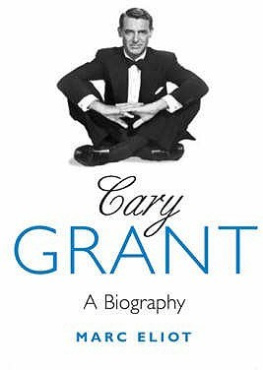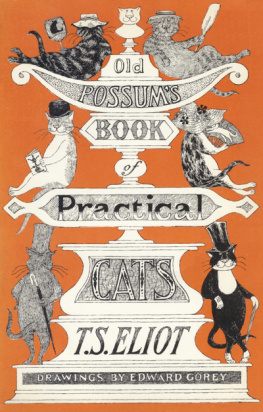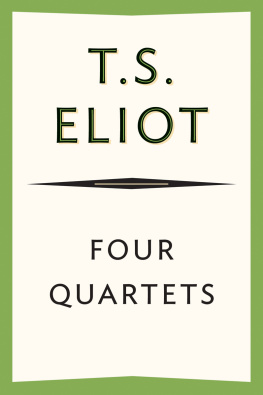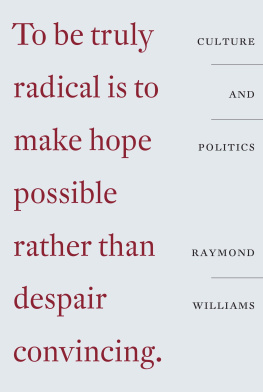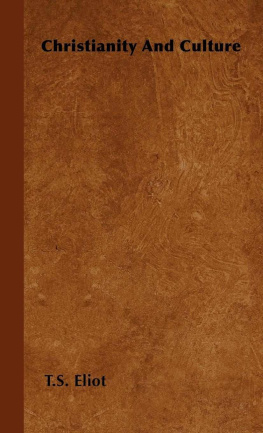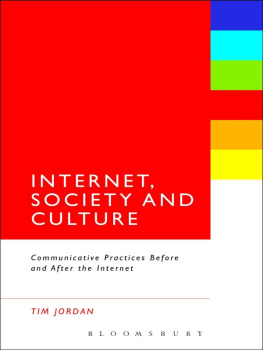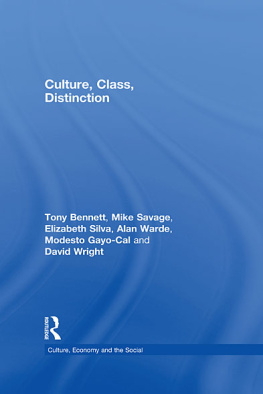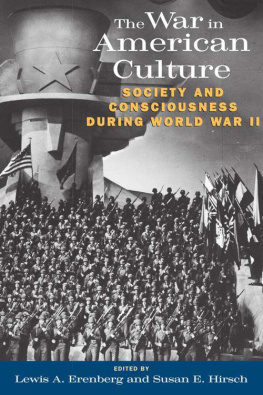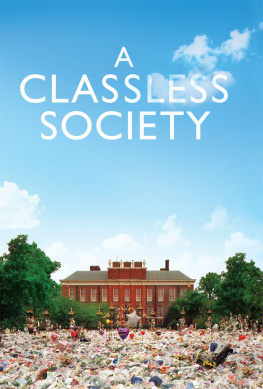
Table of Contents
Copyright, 1949, by
T. S. Eliot
All rights reserved, including the right to reproduce this book or portions thereof in any form.
For information about permission to reproduce selections from this book, write to Permissions, Houghton Mifflin Harcourt Publishing Company, 215 Park Avenue South, New York, New York, 10003.
www.hmhco.com
Library of Congress Cataloging-in-Publication Data is available.
eISBN 978-0-544-35852-2
v1.0214
To
PHILIP MAIRET
in gratitude and admiration
Preface
T HIS essay was begun four or five years ago. A preliminary sketch, under the same title, was published in three successive numbers of The New English Weekly. From this sketch took shape a paper called Cultural Forces in the Human Order, which appeared in the volume Prospect for Christendom, edited by Mr. Maurice B. Reckitt (Faber, 1945): a revision of this paper forms the first chapter of the present book. The second chapter is a revision of a paper published in The New English Review in October, 1945.
I have added as an appendix the English text of three broadcast talks to Germany which have appeared under the title of Die Einheit der Europaeischen Kultur (Carl Habel Verlagsbuchhandlung, Berlin, 1946).
Throughout this study, I recognise a particular debt to the writings of Canon V. A. Demant, Mr. Christopher Dawson, and the late Professor Karl Mannheim. It is the more necessary to acknowledge this debt in general, since I have not in my text referred to the first two of these writers, and since my debt to the third is much greater than appears from the one context in which I discuss his theory.
I have also profited by reading an article by Mr. Dwight Macdonald in Politics (New York) for February 1944, entitled A Theory of Popular Culture and an anonymous critique of this article in the issue of the same periodical for November 1946. Mr. Macdonalds theory strikes me as the best alternative to my own that I have seen.
T. S. E.
January, 1948.
Introduction
I think our studies ought to be all but purposeless. They want to be pursued with chastity like mathematics. ACTON.
M Y purpose in writing the following chapters is not, as might appear from a casual inspection of the table of contents, to outline a social or political philosophy; nor is the book intended to be merely a vehicle for my observations on a variety of topics. My aim is to help to define a word, the word culture.
Just as a doctrine only needs to be defined after the appearance of some heresy, so a word does not need to receive this attention until it has come to be misused. I have observed with growing anxiety the career of this word culture during the past six or seven years. We may find it natural, and significant, that during a period of unparalleled destructiveness, this word should come to have an important role in the journalistic vocabulary. Its part is of course doubled by the word civilisation. I have made no attempt in this essay to determine the frontier between the meanings of these two words: for I came to the conclusion that any such attempt could only produce an artificial distinction, peculiar to the book, which the reader would have difficulty in retaining; and which, after closing the book, he would abandon with a sense of relief. We do use one word, frequently enough, in a context where the other would do as well; there are other contexts where one word obviously fits and the other does not; and I do not think that this need cause embarrassment. There are enough inevitable obstacles, in this discussion, without erecting unnecessary ones.
In August, 1945, there was published the text of a draft constitution for a United Nations Educational Scientific and Cultural Organisation. The purpose of this organisation was, in Article I, defined as follows:
- To develop and maintain mutual understanding and appreciation of the life and culture, the arts, the humanities, and the sciences of the peoples of the world, as a basis for effective international organisation and world peace.
- To co-operate in extending and in making available to all peoples for the service of common human needs the worlds full body of knowledge and culture, and in assuring its contribution to the economic stability, political security, and general well-being of the peoples of the world.
I am not at the moment concerned to extract a meaning from these sentences: I only quote them to call attention to the word culture, and to suggest that before acting on such resolutions we should try to find out what this one word means. This is only one of innumerable instances which might be cited, of the use of a word which nobody bothers to examine. In general, the word is used in two ways: by a kind of synecdoche, when the speaker has in mind one of the elements or evidences of culturesuch as art; or, as in the passage just quoted, as a kind of emotional stimulantor anaesthetic.
At the beginning of my first chapter I have endeavoured to distinguish and relate the three principal uses of the word: and to make the point, that when we use the term in one of these three ways we should do so in awareness of the others. I then try to expose the essential relation of culture to religion, and to make clear the limitations of the word relation as an expression of this relation. The first important assertion is that no culture has appeared or developed except together with a religion: according to the point of view of the observer, the culture will appear to be the product of the religion, or the religion the product of the culture.
In the next three chapters I discuss what seem to me to be three important conditions for culture. The first of these is organic (not merely planned, but growing) structure, such as will foster the hereditary transmission of culture within a culture: and this requires the persistence of social classes. The second is the necessity that a culture should be analysable, geographically, into local cultures: this raises the problem of regionalism. The third is the balance of unity and diversity in religionthat is, universality of doctrine with particularity of cult and devotion. The reader must keep in mind that I am not pretending to account for all the necessary conditions for a flourishing culture; I discuss three which have especially struck my attention. He must also remember that what I offer is not a set of directions for fabricating a culture. I do not say that by setting about to produce these, and any other additional conditions, we can confidently expect to improve our civilisation. I say only that, so far as my observation goes, you are unlikely to have a high civilisation where these conditions are absent.
The remaining two chapters of the book make some slight attempt to disentangle culture from politics and education.
I dare say that some readers will draw political inferences from this discussion: what is more likely is that particular minds will read into my text a confirmation or repudiation of their own political convictions and prejudices. The writer himself is not without political convictions and prejudices; but the imposition of them is no part of his present intention. What I try to say is this: here are what I believe to be essential conditions for the growth and for the survival of culture. If they conflict with any passionate faith of the readerif, for instance, he finds it shocking that culture and equalitarianism should conflict, if it seems monstrous to him that anyone should have advantages of birthI do not ask him to change his faith, I merely ask him to stop paying lip-service to culture. If the reader says: the state of affairs which I wish to bring about is
Next page


